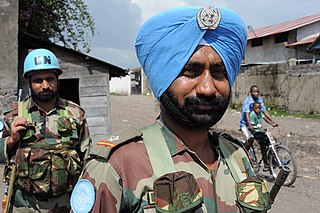
The United Nations Stabilisation Mission in Haiti (UNSTAMIH), also known as MINUSTAH, an acronym of the French name, was a United Nations peacekeeping mission in Haiti that was in operation from 2004 to 2017. The mission's military component was led by the Brazilian Army and the force commander is Brazilian. The force is composed of 2,366 military personnel and 2,533 police, supported by international civilian personnel, a local civilian staff and United Nations Volunteers.
The United Nations Mission in Haiti (UNMIH) was a peacekeeping operation carried out by the United Nations between September 1993 and June 1996. The Mission was reestablished (MINUSTAH) in April 2004, after a rebellion took over most of Haiti and President Bertrand Aristide resigned. Aristide controversially contends that he was forced from office and kidnapped into exile by agents of the United States.

United Nations Security Council Resolution 1542, adopted unanimously on 30 April 2004, after receiving a report by the Secretary-General Kofi Annan, the Council deplored all violations of human rights in Haiti and urged the Government of Haiti to promote and protect human rights with a State based on rule of law and independent judiciary.

United Nations Security Council Resolution 1927, adopted unanimously on June 4, 2010, after recalling previous resolutions on Haiti, including resolutions 1542 (2004), 1576 (2004), 1608 (2005), 1658 (2006), 1702 (2006), 1743 (2006), 1780 (2007), 1840 (2008), 1892 (2009) and 1908 (2010), the Council authorised an additional deployment of 680 police as part of the United Nations Stabilization Mission in Haiti (MINUSTAH).

United Nations Security Council Resolution 1529, adopted unanimously on 29 February 2004, after expressing concern about the situation in Haiti, the Council authorised the deployment of an international force to the country to stabilise the situation following a coup d'état that resulted in the removal of President Jean-Bertrand Aristide from office.

United Nations Security Council resolution 1551, adopted unanimously on 9 July 2004, after recalling previous resolutions on the conflicts in the former Yugoslavia, including resolutions 1031 (1995), 1088 (1996), 1423 (2002) and 1491 (2003), the Council extended the mandate of the Stabilisation Force (SFOR) in Bosnia and Herzegovina for a further period of six months and welcomed the deployment of EUFOR Althea at the end of the SFOR's mandate.

United Nations Security Council Resolution 1944, adopted unanimously on October 14, 2010, after recalling previous resolutions on Haiti, including resolutions 1542 (2004), 1576 (2004), 1608 (2005), 1658 (2006), 1702 (2006), 1743 (2006), 1780 (2007), 1840 (2008), 1892 (2009), 1908 (2010) and 1927 (2010), the Council renewed the mandate of the United Nations Stabilization Mission in Haiti (MINUSTAH) until October 15, 2011.

United Nations Security Council Resolution 1576, adopted unanimously on 29 November 2004, after recalling resolutions 1529 (2004) and 1542 (2004) on the situation in Haiti, the Council extended the mandate of the United Nations Stabilisation Mission in Haiti (MINUSTAH) until June 1, 2005.

United Nations Security Council Resolution 1601, adopted unanimously on 31 May 2005, after recalling resolutions 1529 (2004), 1542 (2004) and 1576 (2004) on the situation in Haiti, the Council extended the mandate of the United Nations Stabilisation Mission in Haiti (MINUSTAH) until 24 June 2005.

United Nations Security Council resolution 1602, adopted unanimously on 31 May 2005, after recalling resolutions 1545 (2004), 1565 (2004), 1577 (2004) and 1596 (2005) on the situation in Burundi, the Council extended the mandate of the United Nations Operation in Burundi (ONUB) for a period of six months until 1 December 2005.

United Nations Security Council Resolution 1608, adopted unanimously on 22 June 2005, after recalling resolutions 1542 (2004) and 1576 (2004) on the situation in Haiti, the Council extended the mandate of the United Nations Stabilisation Mission in Haiti (MINUSTAH) until 15 February 2006 and increased its strength.

United Nations Security Council resolution 1623, adopted unanimously on 13 September 2005, after reaffirming all resolutions on the situation in Afghanistan, particularly resolutions 1386 (2001), 1413 (2002), 1444 (2002), 1510 (2003) and 1563 (2004), and resolutions 1368 (2001) and 1373 (2001) on terrorism, the Council extended the authorisation of the International Security Assistance Force (ISAF) until mid-October 2006.

United Nations Security Council resolution 1635, adopted unanimously on 28 October 2005, after recalling all previous resolutions on the situation in the Democratic Republic of the Congo, including resolutions 1565 (2004), 1592 (2005), 1596 (2005), 1621 (2005) and 1628 (2005), the Council extended the mandate of the United Nations Mission in the Democratic Republic of Congo (MONUC) until 30 September 2006.

United Nations Security Council Resolution 1702, adopted unanimously on August 15, 2006, after recalling resolutions 1542 (2004), 1576 (2004), 1608 (2005) and 1658 (2006) on the situation in Haiti, the Council extended the mandate of the United Nations Stabilisation Mission in Haiti (MINUSTAH) until February 15, 2007.

United Nations Security Council Resolution 2000, adopted unanimously on July 27, 2011, after recalling previous resolutions on the situation in Côte d'Ivoire, including resolutions 1933 (2010), 1942 (2010), 1951 (2010), 1962 (2010), 1967 (2011), 1968 (2011), 1975 (2011), 1980 (2011), 1981 (2011) and 1992 (2011), and Resolution 1938 (2010) on the situation in Liberia, the Council extended the mandate of the United Nations Operation in Côte d'Ivoire (UNOCI) until July 31, 2012.
United Nations Security Council Resolution 1743 was unanimously adopted on 15 February 2007.
United Nations Security Council Resolution 1780 was unanimously adopted on 15 October 2007.
United Nations Security Council Resolution 1892 was unanimously adopted on 13 October 2009.
United Nations Security Council Resolution 1840 was unanimously adopted on 14 October 2008.

The United Nations Mission for Justice Support in Haiti (MINUJUSTH) is a peacekeeping mission in Haiti mandated by the United Nations Security Council through Resolutions 2350 (2017) and 2410 (2018).














